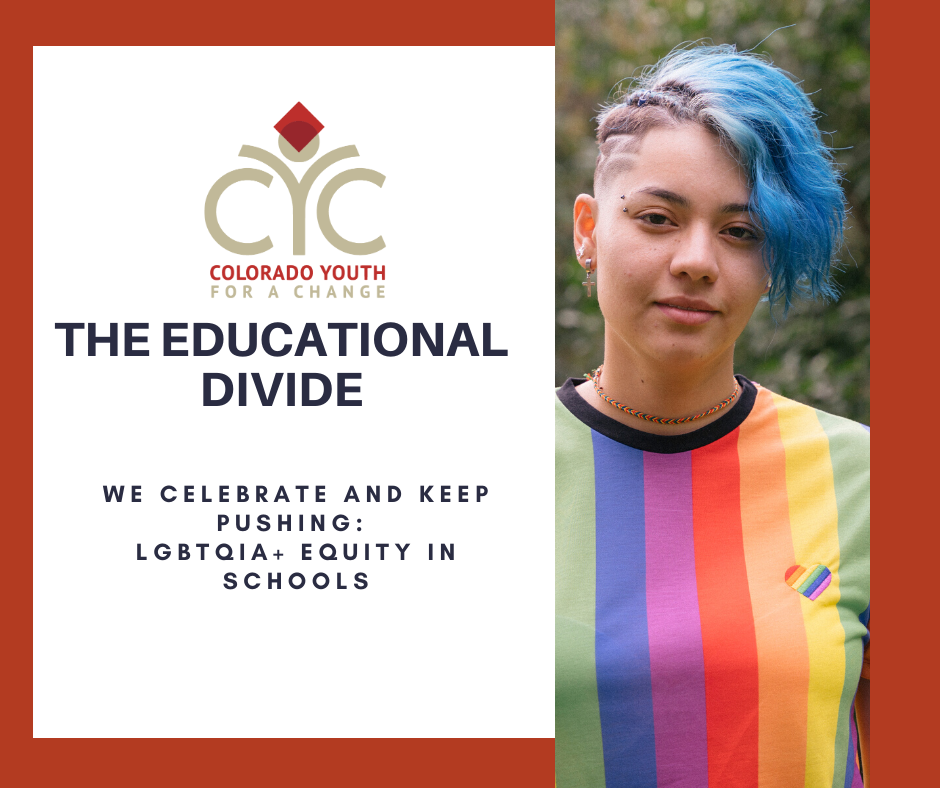By Amelia Federico Soft skills. Durable skills. Essential skills. Core skills. Whatever you call them,…

We Celebrate and Keep Pushing: LGBTQIA+ Equity in Schools
“Why do you need to ask those questions?”, is a phrase commonly heard by CYC staff and AmeriCorps members during our intake process. “Those questions” are as follows:
What is your sexual orientation? What is your gender identity? What are your pronouns?
Unfortunately, our society still stigmatizes LGBTQIA+ (Lesbian, Gay, Bisexual, Transgender, Queer/Questioning, Intersex, Asexual, plus more…) identities, thus making these questions controversial or political. However, at Colorado Youth for a Change (CYC) we recognize that asking our youth these questions is quite the opposite: an integral and imperative part of our work.
On Monday, June 15th the U.S. Supreme Court made a historic ruling that the 1964 Civil Rights Act protects gay, lesbian and transgender employees based on sex. Prior to this decision, in 27 states for example, an individual could marry their same-sex partner on Sunday and be legally fired for being LGBTQIA+ on Monday. In those 27 states, there are over 3.9 million workers who identify as LGBTQIA+. Many of those workers are educators who will finally be able to be their authentic selves at work. When these educators are not worried about losing their job because of one of their identities, they can refocus that energy on creating more affirming, safer and inclusive classroom environments for students of all identities.
Additionally, more LGBTQIA+ representation means that students feel more comfortable coming out. For example, Sam Long, a science teacher in Jefferson County School District, said that his administration “initially pushed back on the idea of his coming out” but eventually he did come out to his students and it had a very positive impact on the community. “We had several students open up about their sexual orientation and one student came out as gender queer”, Sam explained to Chalkbeat in an interview from earlier this yeari. After the recent supreme court ruling, Sam won’t have to worry about push back from administration in the same way. However, a gap between policy and practice still exists. While there may be non-discrimination protections for LGBTQIA+ students and educators in Colorado, the reality is that it is still unsafe, exhausting, and even traumatizing for individuals to be their authentic selves. So how can individuals, schools and community organizations better support youth who identify as LGBTQIA+ in practice? Here are a few helpful tangible action steps that are important aspects of closing the gap between policy and practice:
- Research shows a strong correlation between the presence of school-based GSAs (Gender and Sexuality Alliances) and a variety of positive effects on school climate, student health outcomes, and youth developmentii. Reach out to One Colorado; they can help facilitate creating a successful GSA or providing structure to an already existing GSA.
- Always interrupt derogatory language that stigmatizes LGBTQIA+ students. Hold youth and educators accountable for their words; immediately correct people if they use the wrong pronouns for someone, usey language like “that’s so gay”, etc.
- Reach out to CYC if you are interested in setting up a training around best practices for supporting LGBTQIA+ youth, specifically in supporting transgender youth.
So again, why do we ask those questions?
We ask them because 19.9% of LGB youth and 32.5% of transgender youth have attempted suicide in the past year, compared to 5.1% of heterosexual students and 6.3% of cisgenderiii students. We ask them because 10.8% of LGB youth and 33.5% of transgender youth reported missing school due to feeling unsafe at school, compared to 4.8% of heterosexual youth and 5% of cisgender youthiv. We ask them because there is currently no available data for the dropout rate of students who identify as LGBTQIA+. We ask them because their identities may be impacting their experience at school. We ask them because our students deserve to know that we care enough to ask.
